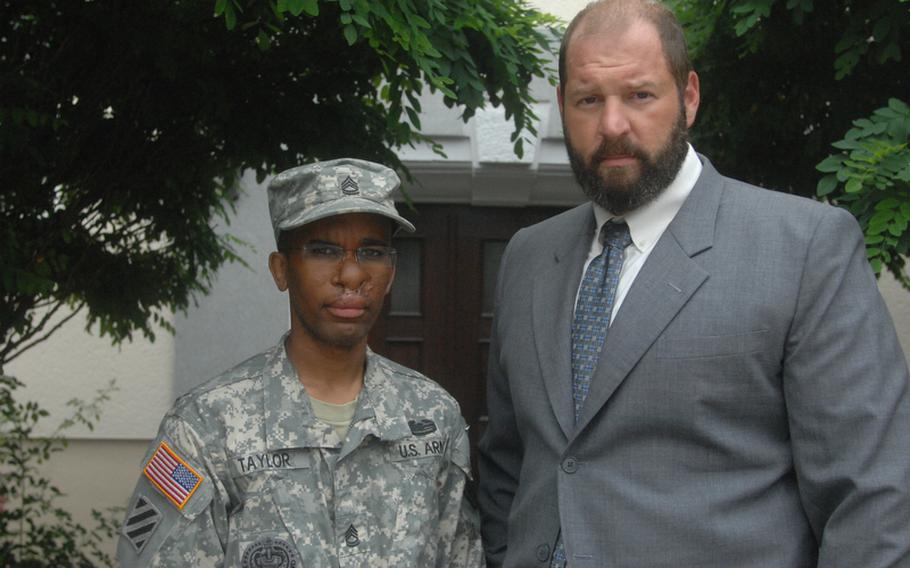
Sgt. 1st Class Walter Taylor stands with his attorney, James Culp, outside the law center in Bamberg, Germany. (Steven Beardsley/Stars and Stripes)
GRAFENWÖHR, Germany — The Army has dismissed its case against a platoon sergeant who was charged with homicide in the shooting death of a prominent Afghan civilian, ending a yearlong investigation that threatened court-martial and imprisonment for the soldier.
The decision allows Sgt. 1st Class Walter Taylor to resume his career and continue treatment for combat wounds he suffered days after the shooting, during another patrol.
Taylor, who could have faced three years in prison for the charge of negligent homicide, called the news a relief. But in a telephone interview Friday, Taylor said he wondered whether the investigation damaged the confidence of soldiers downrange, who, like him, are asked to make split-second decisions in the heat of combat.
“I hope through these events … that these actions are never repeated again, never repeated again,” he said of the investigation. “Because it can cost soldiers their lives and families their loved ones.”
Col. Darren Werner, senior commander of the 16th Sustainment Brigade in Bamberg, dismissed the case on Thursday, amending Taylor’s charge sheet with a large slash through the charges and the word “Dismissed!” Werner’s decision followed a recommendation by an Army investigating officer that the case be dropped.
The Army charged Taylor, of the 54th Engineer Battalion in Bamberg, with negligent homicide and dereliction of duty in May for shooting Afghan civilian Dr. Aqilah Hikmat immediately following a July 2011 firefight involving Taylor’s route clearance platoon in Wardak province.
In a June pre-trial hearing, Taylor, 31, said he believed Hikmat was moments away from detonating a bomb when she stepped out of a car that had strayed into a firefight between U.S. troops and insurgents. Hikmat and her family, returning from a wedding, had attempted to drive around the firefight that erupted after Taylor’s platoon hit a massive roadside bomb, according to investigators.
The platoon fired on the vehicle, killing Hikmat’s son and niece and injuring her husband. Taylor and others later approached the vehicle as they traced what they thought was a command wire — often used to detonate roadside bombs — that appeared to run toward it.
Taylor was severely injured days later on another patrol, after a rocket-propelled grenade struck his vehicle. His face remains disfigured and in need of reconstructive surgery.
The case centered on the military’s rules of engagement and whether the instinct to defend oneself trumps the stated rule that a soldier must positively identify a target before shooting.
Army attorneys argued Taylor failed to properly identify a threat when he pulled the trigger against Hikmat. Taylor’s lawyer, James Culp, argued the Army was “Monday-morning quarterbacking” a split-second decision, and he suggested pressure from Afghan government officials led to the charges.
On Tuesday, an Army investigating officer rejected the Army’s arguments, concluding in a 10-page report following the hearing that Taylor faced a slew of potential threats, each properly identified by himself or his soldiers during the firefight and immediately after.
Citing the rules of engagement in Afghanistan and other military guidance, the investigating officer, Lt. Col. Alva Hart of the 16th Sustainment Brigade, wrote that positive identification was “only possible in hindsight.”
“As expressed throughout the documents in this case, [positive identification] is not a 100% certainty of hostile act or intent but a reasonable certainty based the information at hand (sic),” Hart wrote.
Hart also dismissed two crucial pieces of evidence against Taylor — testimony by a platoon member that Taylor smiled and taunted Hikmat’s husband after the shooting and Taylor’s original statement to a criminal investigating officer.
Taylor describes recent months as numbing. Efforts to push the investigation to the back of his mind often failed, he said, especially when he considered his family. Doubts would arise, questions linger. Friends and fellow soldiers helped him push them back down, he said.
Just as painful was the realization of his own injuries, and those of his platoon, he said. During the pre-trial hearing, several of Taylor’s soldiers struggled to recall basic events and timelines, a problem Taylor has recognized in himself and blames on his injuries.
He insists he won’t hold a grudge against the Army. At 110 pounds, he’s long been accustomed to proving himself, he said.
“I’ve always had to work harder at everything,” he said. “I’ve always had to prove my point.”
He’s already looking forward to the next challenge. After reconstructive operations, he hopes to go to air assault school. If that isn’t possible, he wants to work as a wounded warrior advocate, he said. And if that doesn’t happen, if his Army career is over because of his injuries, Taylor said, he’ll work for Veterans Affairs.
And he still won’t hold a grudge against the Army, he said.
“I will never be mad at the Army, nor will I be mad at this process at all. No ill-feelings toward the Army at all,” Taylor said. “Because as a soldier, you have to know this can happen.”